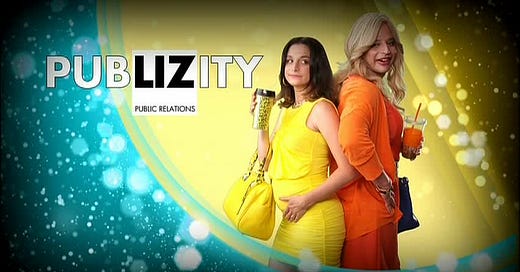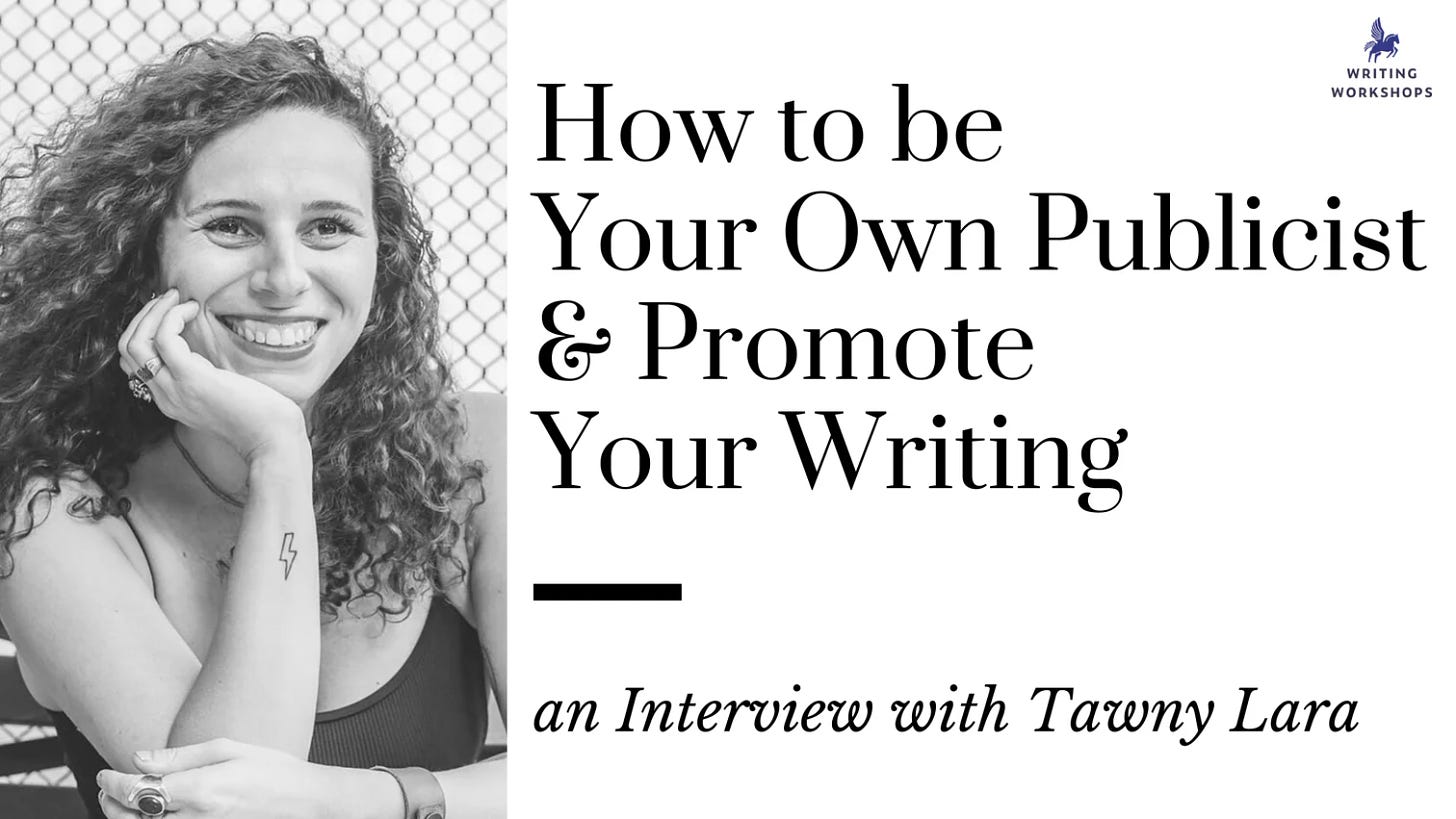In the evolving world of modern book and product promotion, where every click and share counts, mastering the art of self-promotion is no longer a luxury—it's a necessity1. That’s why I created a new course called Be Your Own Publicist: How to Promote Your Writing on October 9th.
ICYMI, I wrote about my approach to DIY publicity in some recent newsletters:
Blake, the founder of WritingWorkshops.com (where I teach my courses), and I recently chatted about this course, including:
Preorder campaigns
The negative side of turning myself into a personal brand
Self-promo without social media
Detailed job descriptions of what a virtual assistant does and what a publicist does.
Writing Workshops: Can you share your journey and what inspired you to create the "Be Your Own Publicist" seminar? How has your experience as an author and entrepreneur shaped this course?
Tawny Lara: I'm an author, public speaker, podcaster, and co-founder of a non-alcoholic drink brand. I wouldn't have any of those job titles without being my own publicist. Years of working with clients 1:1 and now teaching virtual classes taught me that most authors and entrepreneurs (especially women!) are uncomfortable promoting their work for various reasons.
Maybe they're shy. Maybe they have no interest in marketing. Maybe self-promotion feels like bragging. You can have the best writing voice or the coolest new product, but if nobody knows about your work, how can you grow your career? That's where this class comes in. I'll go over approachable paths to promoting your work in a way that feels natural, not cringey.
The funny thing about the internet is that if you consistently talk about a subject, you're often seen as an expert on that subject. That's how I accidentally created an online persona, The Sober Sexpert.
WW: One of the key takeaways from your seminar is identifying your niche without feeling typecast. Can you explain how you found your niche and developed your "Sober Sexpert" persona, and what advice do you have for attendees struggling to find their unique angle?
TL: The funny thing about the internet is that if you consistently talk about a subject, you're often seen as an expert on that subject. That's how I accidentally created an online persona, The Sober Sexpert. I "simply" talked and wrote about my research on the intersection of sobriety and dating. I nerded out on my research because I found it genuinely interesting both as a person in recovery and as a journalist/activist.
I brought that genuine interest and my passion for social change to digital platforms like social media (Instagram, TikTok), traditional media (pitching editors at national magazines/websites), and podcasts.
While I learned how to be my own publicist using social media, I'm now more focused on platforms like Substack, IRL events, and freelance writing. Students who take this course will identify their expertise and then choose which platform(s) feel right for their promotional strategies.
A big value of this course is learning about my book's preorder campaign so writers and entrepreneurs don't make the same mistakes I made. I went way too hard and started way too early, leaving me completely burned out by the time I went on my book tour.
WW: Promoting a book or product can feel overwhelming. What are some strategies you teach in your seminar to make the process of launching a preorder campaign more manageable and successful?
TL: Promoting my book was incredibly overwhelming and exciting and exhausting and many other "-ings." This was equal parts excitement of the whole *OMG, I HAVE A BOOK COMING OUT!* and knowing that traditional publishers expect authors to promote their books—even if their book deal comes with an in-house publicist.
My publisher provided a wonderful publicist, but remember, in-house publicists are also actively promoting lots of other books. I didn't have the money to hire a publicist, so I became my own.
A big value of this course is learning about my book's preorder campaign so writers and entrepreneurs don't make the same mistakes I made. I went way too hard and started way too early, leaving me completely burned out by the time I went on my book tour.
I'll present students with a cautionary tale that shows how turning myself into a personal brand has negatively impacted my mental health while positively impacting my career. It's a super-complex topic that I'm excited to dig into.
WW: Many writers and entrepreneurs feel uncomfortable with self-promotion. How does your seminar help attendees reframe self-promotion as a positive and necessary strategy for success?
TL: Self-promotion is now synonymous with making dance videos to trendy sounds on TikTok or Instagram. We must remember how NEW social media is. We don't need to turn ourselves, our work, or our art into easily digestible 30-second videos just because "everyone else" is. You absolutely can, but that's not what we'll focus on in this class.
Not long ago, self-promotion meant hanging flyers in a coffee shop or placing an ad in the local newspaper. Together, we'll review various examples of self-promotion so students can choose a promotional strategy that best aligns with their personality.
Not long ago, self-promotion meant hanging flyers in a coffee shop or placing an ad in the local newspaper.
WW: Hiring a publicist or virtual assistant can be a significant investment. Can you discuss the pros and cons of these options and provide some insights on how to decide whether to hire help or handle publicity on your own?
TL: There's a reason I present the options of publicist vs virtual assistant. I want students to see the incredibly arduous work that a publicist does and why they charge what they charge.
As someone who's comfortable with self-promotion and has existing media connections, I hired a virtual assistant to help manage those media connections rather than paying a publicist.
This course explains the nuances (and average rates!) of virtual assistants and publicists so students can make an informed decision about which is right for them.
WW: In your seminar, you share what worked, what didn’t, and what you’d do differently in your promotional strategies. Can you give us a sneak peek into some of the key lessons you’ve learned through your experiences?
TL: A big part of my Be-Your-Own-Publicist story includes becoming a "personal brand." I'll present students with a cautionary tale that shows how turning myself into a personal brand has negatively impacted my mental health while positively impacting my career. It's a super-complex topic that I'm excited to dig into.
WW: Who do you think will benefit the most from this seminar, and what are some immediate skills or knowledge participants can expect to gain by the end of the course?
TL: Students will learn how to identify their niche(s), create a basic outline of a book or product preorder campaign, and hear real, frank discussions about how much money it costs to hire a publicist or a virtual assistant. Believe it or not, we'll actually have fun while discussing such heavy subjects!
Happy Humping,
Tawny






